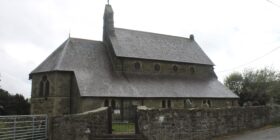Election 2016 – all you need to know about voting today.

Those people who are exercising their democratic right to vote today in the Alyn and Deeside constituency you’ll have been asked to cast three votes.
One vote is for the North Wales Police and Crime Commissioner role – candidates here
The other two are for the National Assembly of Wales.
One is to choose a person to represent the Alyn and Deeside constituency in a ‘first past the post’ ballot.
The other vote is to choose which party, or independent candidate, to represent the North Wales region.
The regional vote will see four additional or top-up Assembly Members elected for north Wales, this is to create a degree of proportional representation.
This system means that the overall number of seats held by each political party more closely reflects the share of the vote that the party receives.
Every five years 60 people are elected to the National Assembly, and they will be making laws and decisions affecting things like Welsh hospitals, schools, transport, the environment and much more.
When the polling stations close, all of the constituency votes are counted and the candidate with the most votes will become the Assembly Member.
That person then becomes your representative for Alyn and Deeside.
There is no minimum number of votes that the winning candidate must get in order to be elected – they just need to have more than any other candidate in 2011 Labour candidate Carl Sargeant won with 52.6% share of the vote.
After the constituency votes have been counted, the regional votes are counted.
Before the election, the political parties put forward a list of candidates.
Once the polling stations are closed, some or all of the parties will get one or more candidates from their list elected as Assembly Members.
Independent candidates (candidates who don’t belong to a particular political party) may also stand for election on a list, this is known as the ‘Additional Member System’.
This means that the more constituency seats a political party has won, the harder it is to gain any additional seats through the regional list system.
It also means that the overall number of seats held by each political party more closely reflects the share of the vote that the party receives.
- Before the election, each political party (or group) puts forward a list of candidates for each region. This means that each party will have a separate list for North Wales, Mid and West Wales, South Wales East, South Wales Central and South Wales West.
- The people of Wales vote for their chosen political party.
- Each party’s total number of regional votes is divided by the number of Assembly Members it has already won in that region through the constituency vote plus one.
- The party with the highest total after this calculation gets the next seat and the person on top of the party’s list is elected (unless he or she has already been elected for a constituency).
- The pattern is repeated until all four regional seats have been decided. The calculation is based on the number of people already elected from that party within the region plus one.
If, for example, a party has no constituency seats in a region, the number of votes it receives is divided by one (because 0+1=1).
If the party has secured one constituency seat in that region, then its number of votes is divided by two (because 1+1=2).
If it has two seats in that region, it is divided by three (because 2+1=3), and so on.
The regional seats won by each political party are filled by the candidates in the order they appear on the party’s list. This order is decided by the party.
An independent candidate is treated as though he or she were a political party with only one name on its list.
HERE’S AN EXAMPLE

The pink party and the grey party have both put forward a list of candidates for the Mid and West Wales region.
We take the number of regional votes gained by each party, then divide that by: (the number of constituency seats won by the party in that region +1).
The pink party has had 300,000 votes in the region and has won two constituency seats within that region.
300,000 ÷ (2+1) = 100,000
The grey party has had 400,000 votes in the same region and has won four constituency seats within that region.
400,000 ÷ (4+1) = 80,000.
So, in this example, the pink party wins the first seat for that particular region and the person from the top of its list will become an Assembly Member. This process will then be repeated until all four regional seats have been decided.
WHAT HAPPENS NEXT?
Once the votes are counted and the results known, 60 Assembly Members are elected to the Assembly. 40 of them are constituency Assembly Members and the other 20 are regional Assembly Members.
Everyone in Wales is represented by one constituency Assembly Member and four regional Assembly Members. All regional and constituency Assembly Members have equal status in the Assembly.
The party with most seats in the Assembly will usually form the Welsh Government for the next five years. If the largest party has half (or fewer) of the seats, it may form a minority government. Alternatively, there may be a coalition government formed from more than one party or independent Assembly Members.
| Alyn and Deeside | |||||
|---|---|---|---|---|---|
| Labour | Carl Sargeant | ||||
| Conservative | Mike Gibbs | ||||
| Liberal Democrats | Peter Williams | ||||
| Plaid Cymru | Jacqueline Hurst | ||||
| UKIP | Michelle Brown | ||||
| Green | Martin Bennewith | ||||
Latest News









